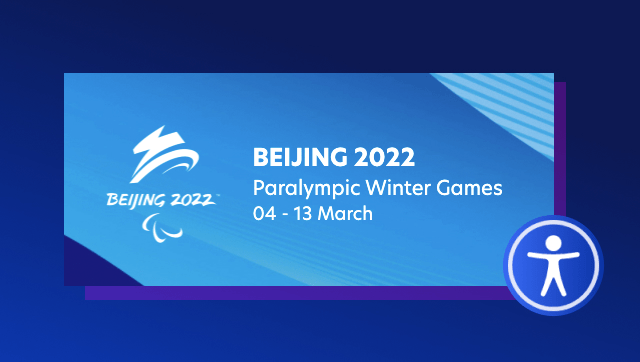UserWay is Making the 2022 Beijing Paralympics Even More Accessible

For a second time, UserWay is the official digital accessibility partner for the Paralympic Games. The collaboration began with the Summer 2020 Paralympics in Tokyo and is continuing for the Winter 2022 Paralympics in Beijing.
When the UserWay suite of products and services are used on a website, it quickly becomes more accessible for people with varying degrees of disabilities, including those who rely on screen readers and other assistive technologies.
UserWay is able to offer a rapid path to compliance with a minimal investment of time and resources.
“UserWay is proud to continue our partnership with the International Paralympic Committee to make the games more accessible for the athletes and fans,” Allon Mason, CEO of UserWay, said.
The UserWay widget is visible in the top-right corner of the Beijing 2022 Paralympic Winter Games website. When clicked, it offers visitors a powerful set of customization options that can be activated with just a click. Some highlights of what’s available are listed below:
Screen Reader – This tool reads the text on the page at three different speeds. The best way to use this feature is to navigate the page with the tab or arrow keys. Anyone with a vision impairment who isn’t currently using an assistive technology like JAWS or NVDA will find this feature helpful.
Dictionary – Any word can be typed or pasted into the integrated Merriam-Webster dictionary. Results are displayed directly in the widget with an option for definitions to be read aloud. Each result also links directly to its Wikipedia page where more details can be found.
Smart Contrast – Vision impairments can sometimes make it difficult to read text when it is placed on photos and similarly colored backgrounds. Smart Contrast is able to detect where these problems occur on a website and automatically correct them.
Highlight Links – It’s not always obvious which text and other objects are links. Highlight Links changes the color of these items to make them easier to recognize.
Text Adjustments – There are four basic text adjustment features in the widget: Bigger Text, Text Spacing, Line Height and Text Align. These options allow each website visitor to customize their reading experience to meet their individual needs.
Pause Animations – People with epilepsy and other conditions that can cause seizures may need to avoid being exposed to fast moving animations. The Pause Animations button allows these visitors to browse a website they otherwise couldn’t.
Dyslexia-Friendly Font – This research-based font can help people with dyslexia experience fewer problems when reading text. Aside from thicker lines at the bottom of their shapes, letters like p and q that are frequently confused have unique designs.
Page Structure – This creates a site map that can easily be navigated to quickly search section headings and links.
Saturation – Approximately 1 in 8 men and 1 in 200 women are color blind. Changing saturation levels on a website can help these web users distinguish text and links from backgrounds.
Hidden Features Within the UserWay Widget
There are many more features included with the AI-Powered UserWay Accessibility Widget that aren’t user-controlled. The AI works behind the scenes of a website to remediate its code to make it Web Content Accessibility Guidelines (WCAG) compliant. Among the most significant changes it makes is keyboard-only navigation.
People with hand injuries and other types of motor impairments, in addition to the blind, are not always able to use a mouse. UserWay makes it possible for these users to move through a website with just the tab or arrow keys.
It’s also important for all images and buttons on a website to include alt-text information. These tags provide detailed descriptions that are read aloud by screen readers and other assistive devices frequently used by blind website visitors.
UserWay AI automatically writes and inserts this information anywhere it is missing.
Paralympics Accessibility Keeps Getting Better
Beyond the work UserWay is doing to make the Paralympics website more accessible, its broadcast partner NBCUniversal is also making a significant difference.
In addition to its closed captioning services for all Paralympic events on its broadcast and cable networks, NBC will provide closed captioning for all digital live streams. It will also include audio description services that add extra context to visual content for blind and visually impaired viewers.
The Winter Beijing 2022 Paralympics will run from March 4 to 13 and host athletes competing in 78 events across six sports.
The competition will span five venues located in central Beijing, Yanqing and Zhangjiakou. Three countries will also be making their Winter Paralympics debut at Beijing 2022 – Israel, Azerbaijan and Puerto Rico.




Share